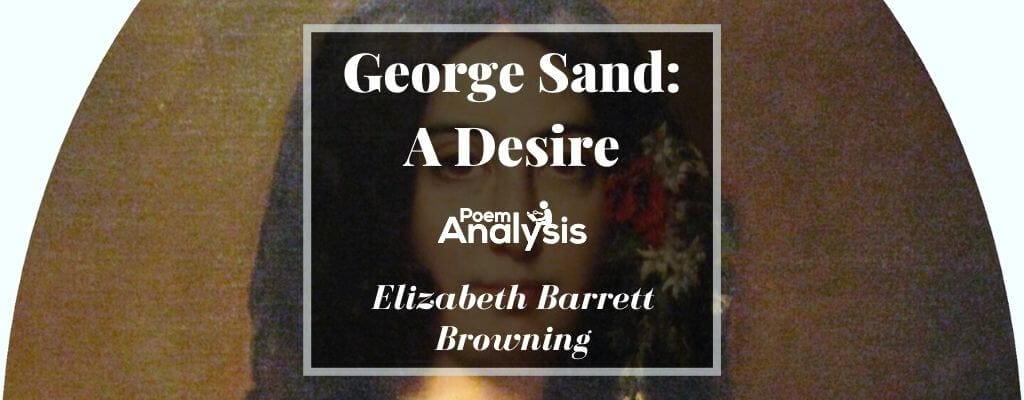‘George Sand: A Desire‘ by Elizabeth Barrett Browning is an Italian or Petrarchan sonnet that is made up of fourteen lines. These lines follow a traditional pattern of abbaabbacdcdcd. The poem can be separated into an initial octave, or set of eight lines, and a final sestet, or set of six lines.
George Sand: A Desire Elizabeth Barrett BrowningThou large-brained woman and large-hearted man,Self-called George Sand! whose soul, amid the lionsOf thy tumultuous senses, moans defianceAnd answers roar for roar, as spirits can:I would some mild miraculous thunder ranAbove the applauded circus, in applianceOf thine own nobler nature's strength and science,Drawing two pinions, white as wings of swan,From thy strong shoulders, to amaze the placeWith holier light! that thou to woman's claimAnd man's, mightst join beside the angel's graceOf a pure genius sanctified from blameTill child and maiden pressed to thine embraceTo kiss upon thy lips a stainless fame.
Summary
‘George Sand: A Desire‘ begins with the speaker praising Amantine-Lucile-Aurore Dupin for her brains and her heart. She takes on the qualities of both man and woman in her writing. Browning calls out Dupin for her choice to be known as George Sand, and then continues on to celebrate the strength it took for Dupin to write as she did, and about what she did. She answered the world “roar for roar.”
The speaker continues on to describe the way she believes that Dupin should be celebrated. The real woman behind the name is unknown, and Browning wishes that by some miracle of heaven, that Dupin could be raised up above the “circus” of the world and shown as she truly is. On the back of this ascension, she will find her place in heaven alongside Mary and Jesus, who will welcome her.
The work that she accomplished and her own personal fame will no longer be tainted by George Sand.
Analysis of George Sand: A Desire
Lines 1-4
Thou large-brained woman and large-hearted man,
Self-called George Sand! whose soul, amid the lions
Of thy tumultuous senses, moans defiance
And answers roar for roar, as spirits can:
The speaker begins ‘George Sand: A Desire‘ by introducing the woman to whom this poem is dedicated. Without prior knowledge, understanding the meaning proves difficult, but once one knows that “George Sand” was the pen name of the female poet, Amantine-Lucile-Aurore Dupin, the poem’s true nature reveals itself.
In the first, fairly well-known line, the speaker addresses Dupin as both a man and a woman. She is “large-brained” in that she is an exceptional writer, and she is “large-hearted” because of the emotion that is intrinsic to her writings as George Sand. One might notice that Browning has chosen to refer to the woman as smart, and the man as emotional. This traditional gender swap played into the swapping of genders that many female writers participated in an effort to have their work seriously considered.
In the second line Browning directly calls out Dupin and her choice to call herself, “George Sand!” and follows this with three lines of appreciation for what Dupin did, and what her writing achieved. The work that she accomplished was inherently brave and progressive, especially in an age in which women were not considered capable of writing anything worthwhile. Her pseudonym was brave as a “lion” and matched the “roars” of the world.
Lines 5-8
I would some mild miraculous thunder ran
Above the applauded circus, in appliance
Of thine own nobler nature’s strength and science,
Drawing two pinions, white as wings of swan,
In the second half of the octave, the speaker states what she “desires” to happen to, and for, Dupin. This “wish” is solely metaphorical in nature, but it does vividly represent how Browning felt about Dupin’s contributions, as a writer and as a woman, to the craft.
She wants, in the circus that is the modern world, for there to be a brief clap of thunder over the heads of those “applauding” the world’s norms. From this thunder, Dupin’s strength would be celebrated. It would be as if “two pinions,” or the outer parts of the bird’s wings, would come down and draw Dupin into the shape of a “white…swan.” This is a form that Browning sees as equivalent to what Dupin has contributed.
Browning knows that the pseudonym has done what it was meant to, but she deeply desires the real woman behind the man’s name to be celebrated as she should.
Lines 9-14
From thy strong shoulders, to amaze the place
With holier light! that thou to woman’s claim
And man’s, mightst join beside the angel’s grace
Of a pure genius sanctified from blame
Till child and maiden pressed to thine embrace
To kiss upon thy lips a stainless fame.
These thoughts continue into the last six lines. These “swan” wings will come from Dupin’s shoulders and, perhaps, lift her up above the crowd so that all may see who she truly is.
She will be as an angel, and will, in her beauty, “amaze the place / With holier light!” The entire world will be stunned to see her and Dupin will finally have the recognition she deserves. The reader’s of literature, and the promoters of gender norms, will see that “woman’s claim” on writing is just as strong as “man’s” and that this writer who is now being celebrated will be praised as a genius in heaven.
Dupin will have her rightful place among the most beautiful and brilliant people to have walked the earth. She will be truly appreciated in heaven and meet with “child and maiden,” or Mary and Christ, who will take her into their embrace. No part of her fame will be shrouded at this point. It will be clear who she is, and why her work is important.
About Elizabeth Barrett Browning
Elizabeth Barrett Browning was born in 1806 in Durham, England. She was the firstborn out of twelve children, was educated at home through the works of Milton and Shakespeare. She also began writing poetry at a young age, finishing her first epic poem at the age of twelve. Browning also suffered from a number of maladies from a young age, particularly a lung ailment for which she took morphine for the rest of her life. As a teenager, Browning taught herself Hebrew and studied Greek classics.
It was in 1826 the Browning anonymously published her first collection, An Essay on Mind and Other Poems. During this time period, Browning’s family suffered financial troubles and ended up settling in London. In the 1830’s Browning first started getting attention for her work. She wrote The Seraphim and Other Poems in 1838 through which she expressed traditional Christian beliefs, which were very dear to her, through Greek tragedies.
The following years of Browning’s life were filled with illness and loss. She spent a year living with her brother Edward at the sea of Torquay. Edward died while sailing there and Browning returned home, living as a recluse for the next five years. in 1844 she published Poems and she met the writer Robert Browning. The two began a romance that was opposed by Elizabeth’s father, eloping in 1846. The collection that is generally considered her best work, Sonnets from the Portuguese, was published in 1850. After publishing a number of works about social injustice, Elizabeth died in Florence in 1861.




